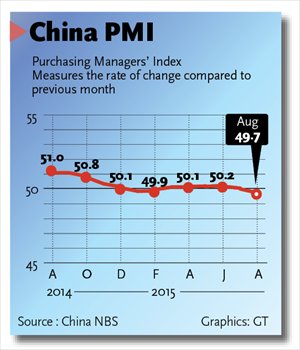
Stimulus will steadily bear fruit: economist
Activity in China's manufacturing sector in August slowed at its fastest pace in three years, reinforcing concerns over the significant downward pressure faced by the world's second-largest economy.
But the effects of the central government's stimulus measures will gradually bear fruit, experts said on Tuesday.
China's official Purchasing Managers' Index (PMI) slipped to 49.7 in August, down from July's reading of 50, according to data released by the National Bureau of Statistics (NBS) and the China Federation of Logistics and Purchasing on Tuesday. The reading, which falls below the 50 mark that separates expansion from contraction, represents the lowest level since August 2012.
Zhao Qinghe, a senior NBS analyst, said he attributes August's slower manufacturing activities to continuous structural adjustments, extreme weather conditions in some regions, anti-air pollution measures in Beijing, Tianjin and Hebei Province as well as weak market demand.
He also said Tuesday in a statement published on the NBS website that despite the PMI retreat, some positive factors continue to emerge, with sub-indices measuring activities in the high-tech and consumer goods industries both continuing to expand in August, reaching 52.2 and 54.6, respectively.
"The Chinese economy may be facing downward pressure, but some temporary factors, such as storms and air pollution control ahead of the parade in Beijing, have affected the latest PMI reading to a certain extent," Xi Junyang, a professor at the Shanghai University of Finance and Economics, told the Global Times.
Meantime, the Caixin/Markit's PMI fell to 47.3 in August, down from July's 47.8, the lowest level since March 2009, Caixin Media and research firm Markit announced on Tuesday.
Under the Caixin/Markit's PMI series, sub-indices measuring new businesses, new export orders, raw material inventories and employment contracted in August.
The official PMI is based on samples of large State-owned enterprises (SOEs), while the Caixin PMI focuses on small and medium-sized firms (SMEs).
Positive indicators
The August contraction adds to mounting concerns over whether the country would be able to achieve its annual economic growth target of 7 percent for 2015. China's GDP grew by 7 percent from a year earlier in the first half of this year, while its manufacturing sector fared worse in August.
But according to Zhang Liqun, a macroeconomics research fellow at the Development Research Center of the State Council, the current economic situation is complicated. While downward pressure faces the economy, the central government has been rolling out stimulus measures to stabilize growth at the same time.
Specifically, on August 25, the People's Bank of China cut key interest rates and reduced the minimum reserves banks are required to keep to boost economic growth.
The effects of such policies are working gradually, Zhang added, citing steady consumption growth and the recovering property market.
During the first 28 days of August, China's electrical consumption, a key indicator of economic performance, increased 2.97 percent from the same period last year, or 6.54 percentage points higher than in July, the National Development and Reform Commission announced on Sunday.
Average home prices in China's 100 biggest cities rose 0.15 percent in August from the same period last year, reversing a 10-month slide, data from the China Index Academy showed on Tuesday.
"Some economic data remain relatively weak, but capital levels have been recovering, which are expected to help the economy stabilize," Everbright Securities said in a research note sent to the Global Times. "The expanded debt-for-bond swap program for local governments and the accelerated issuance of corporate bonds will funnel more money from the financial system into the real economy, effectively easing its financing difficulties."
On the other hand, the country's services sector remained robust.
The official non-manufacturing PMI fell from July's reading of 53.9 to 53.4 in August, but still expanded, NBS data showed.
The Caixin PMI for the services sector was also above a reading of 50, staying at 51.5 in August, down from 53.8 in July.
Zhao said the slight decline in the services PMI was caused by reduced financial activities due to the recent stock market turbulence.


















































